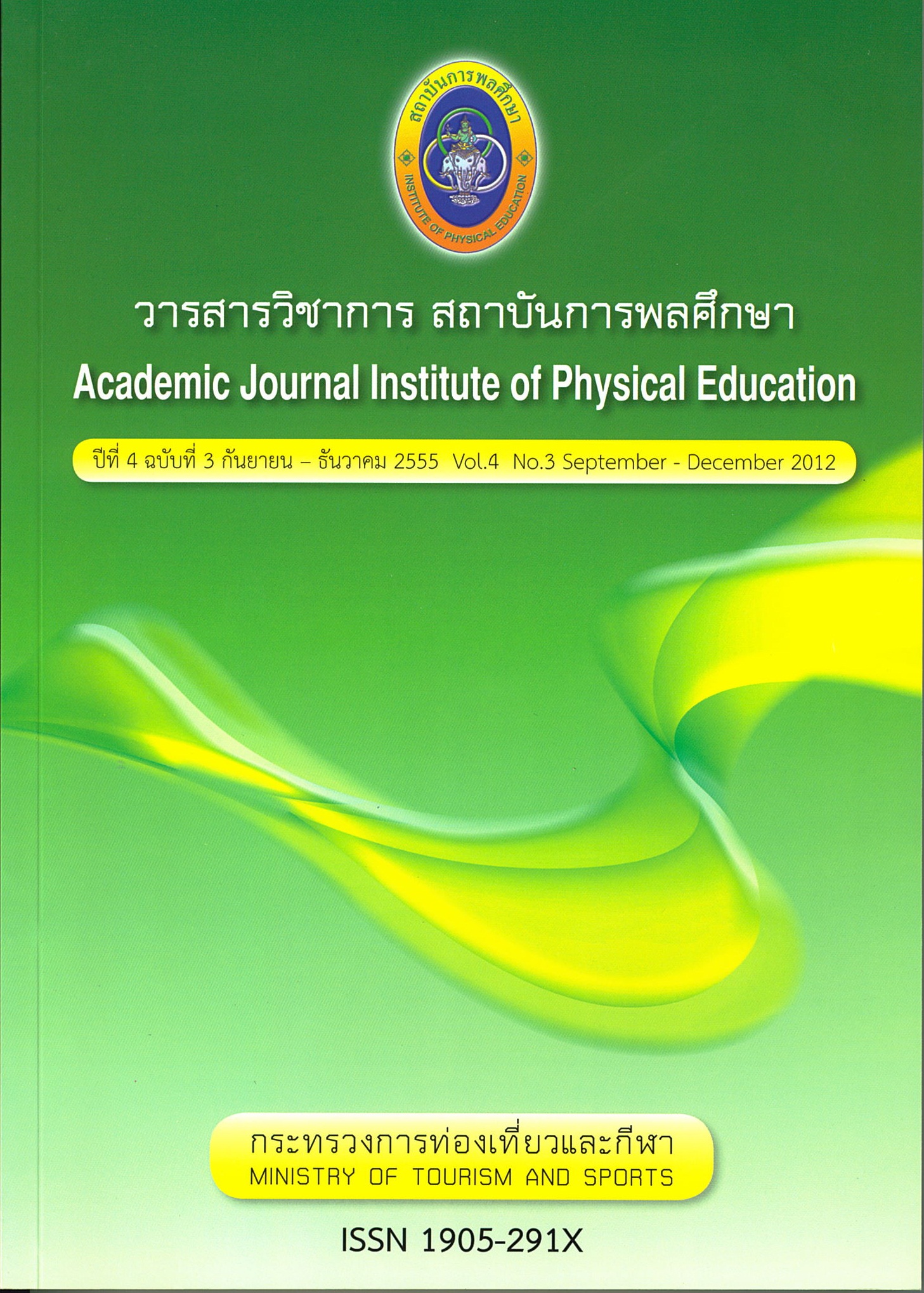The Development of Measurement and Evaluation Teaching Aid through Website
Main Article Content
Abstract
The purposes of this research were to develop the Measurement and Evaluation Teaching Aids through Website for IT. The sampling group of the research were the students of the faculty of Education who were studying in the first semester of 2009 academic year. There were 26 Purposive Sampling students : 3 students for the first sampling, 6 students for the second and 17 students for the experimental sampling. The tools used in the research were the Development of Education Measurement and Evaluation Teaching Aids, Learning Achievement Test, Efficiency Evaluation Seale and Satisfactory Evaluation Scale. The statistics used for this research were description statistics including : Percentile, Mean, Standard Deviation E1/E2 value. The statistics used for data analysis before and after studying were the t-test Dependent Sampling The results of research were :
- The quality of Educational Measurement and Evaluation Teaching Aids through Website was in a good level. (
= 4.44) and the quality of the media production was excellent (
= 4.56)
- The efficiency of Educational Measurement and Evaluation Teaching Aids through Website was at 75.65/78.19
- The result of learning through The Educational Measurement and Evaluation Teaching Aids through Website was 0.05 significantly better than learning without the Teaching Aids.
- The satisfaction of the students for Educational Measurement and Evaluation Teaching Aids through Website was in a good level (
= 4.45)
Article Details
The published article is a copyright of the Academic Journal of Thailand National Sports University. The passage appeared in each article in this academic journal is a perspective of each author which is not related to the journal. Each author is required to be responsible for all components of his/her own article. If there are any mistakes, each author must be responsible for those mistakes on his/her own.
References
กาเย่ (2550), ระบบการเรียนการสอนของกาเย. สืบค้นเมื่อ 25 ตุลาคม 2550, จาก : http://www.google.co.th
จงดี กากแก้ว. (2551). การพัฒนาบทเรียนการสอนผ่านเว็บวิชานวัตกรรมและเทคโนโลยีทางการศึกษา. ชุมพร : สถาบันการพลศึกษาวิทยาเขตชุมพร.
ชัยอนันต์ สมุทรวณิช. (2540), วิสัยทัศน์ในการพัฒนาประเทศในศตวรรษที่ 21 : สู่ความเสมอภาคทางความคล่องแคล่วทางด้านเทคโนโลยีใน “เอกสารประกอบการสัมมนาเรื่องอิทธิพลและทิศทางมัลติมีเดียกับสังคมไทย” กรุงเทพฯ : กระทรวงวิทยาศาสตร์เทคโนโลยีและสิ่งแวดล้อม.
เทียนชัย ทองวินิชศิลป และคณะ. (2549). รายงานการวิจัยเรื่องการพัฒนาเว็บเพจการสอน รายวิชากลวิธีการฝึกและการจัดการกีฬาว่ายน้ํา สถาบันการพลศึกษา วิทยาเขตสุโขทัย.
นฤมล รอดเนียม. (2546). “บทเรียนการสอนผ่านเว็บเรื่องอินเทอร์เน็ต วิชาคอมพิวเตอร์และเทคโนโลยีสารสนเทศ.” วิทยานิพนธ์ วิทยาศาสตร์มหาบัณฑิต. สถาบันเทคโนโลยีพระจอมเกล้าเจ้าคุณทหารลาดกระบัง.
บุปผชาติ ทัฬหกรณ์. (2546), เทคโนโลยีสารสนเทศทางวิทยาศาสตรศึกษา. กรุงเทพฯ : มหาวิทยาลัยเกษตรศาสตร์.
ลีนา ทองมาก และ ปทุมารียา ธัมมราชิกา. (2550). การพัฒนา บทเรียนผ่านเครือข่ายอินเทอร์เน็ตเพื่อการทบทวนเรื่อง ระบบกระดูก, ชุมพร: สถาบันการพลศึกษาวิทยาเขตชุมพร.
สิริพร ทิพย์สูงเนิน, (2547). “การสร้างและหาประสิทธิภาพของ บทเรียน e - Learning เรื่องความรู้เบื้องต้นเกี่ยวกับคอมพิวเตอร์และอินเทอร์เน็ตสําหรับนักเรียนชั้นมัธยมศึกษาตอนปลาย สังกัดกรมสามัญศึกษา วิทยานิพนธ์ปริญญามหาบัณฑิต สถาบันเทคโนโลยีพระจอมเกล้าพระนครเหนือ.
สุกฤษณ์ สุวรรณกูฏ. (2549). “การพัฒนาบทเรียนคอมพิวเตอร์มัลติมิเดียเรื่องทฤษฎีทางจิตวิทยา วิชาพื้นฐานทางจิตวิทยาของการศึกษาระดับปริญญาโททางการศึกษา ปริญญานิพนธ์การศึกษามหาบัณฑิต มหาวิทยาลัยศรีนครินทรวิโรฒ.
สํานักงานคณะกรรมการการศึกษาแห่งชาติ. (2542), พระราชบัญญัติการศึกษาแห่งชาติ. สืบค้นเมื่อ 18 ธันวาคม 2551, จาก http://www.once.go.th/Act/law2542/salaw2542.pdf?
Candy, Philip C. (1991). Self - Direct for Lifelong Learning. San Francisco : Jossey - Bass Publisher.
Dixon, W.B. (1992). “An Exploration Study of Self - directed Learning Ruddiness and Pedagogical” Exploration about Learning among Adult Imamate Learners in Michigan. Doctoral dissertation, Michigan State University, 1992. Dissertation Abstracts International. 55/07 (19995) : 1789.
Skinner, B.F. (1972). Beyond Freedom and Dignity. New York : Alfred A. Knopf.
Zhao. Yong. (1998). “Design for Adaption:The Development of an Integrated Web - based Education Environment” Journal of Research on Computing in Education. 17(3): 113 - 132.


